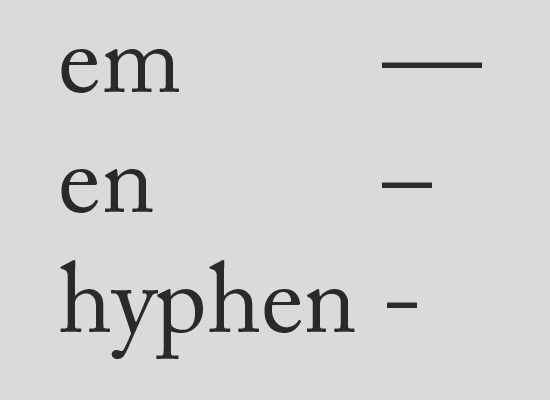
Do you overuse em dashes? I do too. It’s because they are awesomely useful:
A dash can replace a comma to add emphasis—“She was born in Philadelphia—and a beautiful day it was.”
A dash can replace a colon, to introduce the information that follows it—“Her parents always remember her birthday—July 4, 1976.”
A dash can also replace parentheses to indicate, well, parenthetical material—“On the day she was born—it was also the 200th birthday of the United States—her father wore red, white, and blue.”
A dash can be used to indicate the interruption of one thought with another—and its resumption —“When she was twelve she asked—because she was curious—why there were always fireworks on her birthday.”
A dash can indicate an abrupt change—“She was supposed to be a boy—but she wasn’t.”
Merrill Perlman: On, Dasher! | Columbia Journalism Review
Also, here’s how to make an em dash on a Mac:
Option + Shift + – (hyphen)
And here’s a case against the em dash from—who else?—the contrarians at Slate.
December 5, 2011
Farhad Manjoo explains why you should never, ever use two spaces after a period:
Every modern typographer agrees on the one-space rule. It’s one of the canonical rules of the profession, in the same way that waiters know that the salad fork goes to the left of the dinner fork and fashion designers know to put men’s shirt buttons on the right and women’s on the left. Every major style guide—including the Modern Language Association Style Manual and the Chicago Manual of Style—prescribes a single space after a period. (The Publications Manual of the American Psychological Association, used widely in the social sciences, allows for two spaces in draft manuscripts but recommends one space in published work.) Most ordinary people would know the one-space rule, too, if it weren’t for a quirk of history. In the middle of the last century, a now-outmoded technology—the manual typewriter—invaded the American workplace. To accommodate that machine’s shortcomings, everyone began to type wrong. And even though we no longer use typewriters, we all still type like we do. (Also see the persistence of the dreaded Caps Lock key.)
Two spaces after a period: Why you should never, ever do it. – Slate Magazine.
December 1, 2011
I came across this quote recently and it was exactly what I needed to hear:
Let no one be slow to seek wisdom when he is young nor weary in the search of it when he has grown old. For no age is too early or too late for the health of the soul. And to say that the season for studying philosophy has not yet come, or that it is past and gone, is like saying that the season for happiness is not yet or that it is now no more. Therefore, both old and young alike ought to seek wisdom, the former in order that, as age comes over him, he may be young in good things because of the grace of what has been, and the latter in order that, while he is young, he may at the same time be old, because he has no fear of the things which are to come. So we must exercise ourselves in the things which bring happiness, since, if that be present, we have everything, and, if that be absent, all our actions are directed towards attaining it.
—Epicurus, Letter to Menoeceus
December 1, 2011
